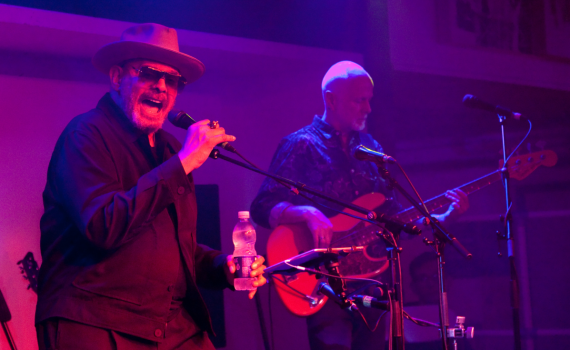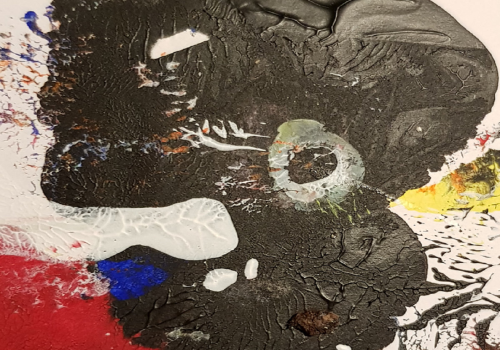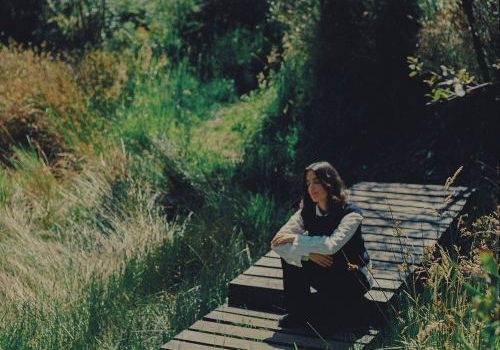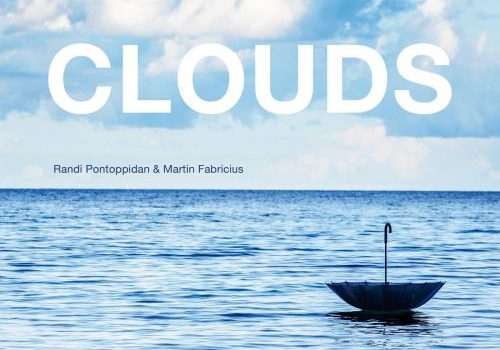The basic premise behind this album is the use of Jo David Meyer Lysne's self-designed e-bows on guitar strings to produce naturally occurring random harmonics. As the e-bows have adjustable speeds, so the results are infinite due to other overtones created by the different resonances. There is an element of patience demanded of the player, but the end result is an absolute ever-evolving delight and when allied to Peder Simonsen's microtonal tuba, modular synth and pyrex bowls, the range of tones is pretty impressive.
Yearly archives: 2024
I have this thing with free jazz where I tend to enjoy it live but have less time for it on record. By and large something gets lost in translation, or the live situation means there's nothing else to concentrate on and the sound is large and physical. This set though -- it's got everything you'd want.
...Covid restrictions kicked in and this album became a game of two halves, with ideas and basic tracks batted both ways across the ocean. To make it more interactive, both parties recorded over the same period of time and it was taken in turns who would lay down the initial ideas and who would then react to those. The album was intended as a commentary on the increasing role AI plays in entertainment and ironically, the enforced separation has played into humanity's hands.
We meet our protagonist, the hulking mountain man Sensaku (played by legend of Japanese wrestling, Keiji Muto), as he reaches Tokyo from his home in Hokkaido, intent on finding his vanished fiancée who came to the city to study. Here he roams the junkyards and dive bars, finding himself stumbling into a subterranean world of modern-day gladiatorial combat that he must explore if he is to ever find his love. In amongst battling people to the death, he meets an opera singer no longer able to sing (Michiru Akiyoshi) and the two begin to roam the city together.
Of that initial flush of '80s/'90s noise guitar bands, the Telescopes have done the most to leave their history far behind, ploughing an awkward distorted furrow that somehow turns up gems with every release, their bittersweet melodies hidden beneath ever deeper beneath layers of shimmering murk. I like Stephen Lawrie's attitude towards them; seeing himself more as a guardian of the name rather than it being about him. He channels ideas and uses whomever may turn up to realise those sounds.
...the production on this record is excellent. While this is traditional music, there’s plenty of subtle but useful studio frippery at hand — wee background synths to fill out a sound, a good sense of instrument spacing, pushing the bass to drive home rhythms and so on.
Having decided to record again, they chose to invite saxophonist Josephine Davies to add further texture and different impulses to their duo set up and that wise decision has thrown further light onto an already gleaming path. A surreptitious dream of sound, improvised and recorded live, the album highlights shared visions yet as seen from three perspectives, tied together in a natural whole.
Eric Chenaux has been ploughing his unique solo path for twenty years or more, but apart from the odd collaboration has generally gone it alone; guitar, pedals and that voice hovering above us, gazing serenely. Here on the latest album we are introduced for the first time to his trio, long-time friend Ryan Driver on Wurlitzer and vocalist and percussionist Philippe Melanson.
Discus is probably better known for the jazz / free business, so Mzyklypop is quite a contrast. Difficult to pin down directly — bits of old pop, bits of industrial, touches of electro-pop, torch songs and the like. Your mum would probably like bits of it and be squirming elsewhere. Depends on your mum, obvs.
A soft, insidious voice over a vaguely threatening throb shines a murky light on the farmyard as a dark, dangerous place. Cattle are given a voice, compared to humans and then given no choice as the electronic quagmire oozes around them. Animals are taken advantage of, figures of fun for our amusement and at their cost while in the distance away from this fœtid scene, the wilderness at the edges of the land are recounted in loving detail. Where nature tries to reclaim, so beauty is finally found.
For my money, my problem with prog is that it misses out on colour and variation -- it's all well and good having twenty-minute songs, but if it's effectively five songs shunted together, or one idea drilled into the ground, it's just pish. Not the case with ANTA -- they do move around a lot, but keep harmonic and melodic continuity; there's plenty of time signature-hopping, but it's complementary rather than discontinuous (which very quickly sounds like smart-arsery in my book).
With PJ Harvey as executive producer and Mike Patton namechecked on the cover, he clearly has some heavy hitting friends, but this is a solo tour de force; a labour of love that finds him playing ukelin, organ, piano, pedal steel, various guitars and basses, with just his friend Mike Kenney helping out on fiddle for two of the nine tracks.
What the book does superbly is positioning the group as a product of their time period, whilst avoiding the great swathes of cliché that have swamped narratives of this era. It clarifies that, as much as punk opened the doors for bedroom Beefheart and Stockhausen obsessives, most of the groups that had any kind of commercial success were still largely in thrall to the glam tentpoles of Bowie and Roxy Music, as well as the tougher end of pub rock. It posits all this whilst articulating clearly how these influences percolated in the surrounding culture of the era, and how this created music that sounded so distant from its core initial influences.
I’ve absolutely loved this band ever since Upset The Rhythm re-released their ill-fated debut back in 2017 and how I’m glad to say I’m hearing fresh material that’s positively abuzz with that subtle beguile that hooked me in the first place. My eye is drawn to, caught in the bleak Stalingrad ruins of the cover. A circle of stone children in frozen celebration taunting the crocodile at its centre as a dirty plumb of destruction ravens the sky. My pupils eating up the image’s futility, civilisation's failing hope entrapped in its accusing stillness.
I must admit, I was expecting more of the soundtrack stuff, so to see him front and centre, really living the songs and acting the parts was quite a revelation with his lovely black and white Airline guitar part of the scene. In front of him was a small electronic device which contained backing elements, but really it was about the interaction of the trio that made the show pop.
And speaking of bright side, I'm not sure this record has one; it's like a sticky crawl through some hypnogogic desert-cum-abandoned-shipyard. It's not lacking in wit, or at least the uncanny oddness of a kid laughing, but it's consistently weird.
Costa Rican pianist and composer Sofi Paez has a touch as light as a feather and her first collection of pieces, Silent Stories, conjures numinous images of pastoral landscapes. The album skips from rolling piano momentum to more considered vocal-based pieces that slow the heart rate and this sense of fleeting abandon, along with Sofi's deft touch, is part of the charm of the LP.
Vocalist Randi Pontoppidan and vibraphonist Martin Fabricius met while studying under Jamaladeen Tacuma at a jazz workshop in 2016. Jamaladeen insisted on recording an off the cuff session with the two and after that release, the pair continued working together, collating the pieces to be recorded for this album whilst working on other projects. Clouds' long gestation introduces a sense of comfort between the two players and an otherworldly ethereality that places the eleven compositions collected here well outside any prevailing styles.

















